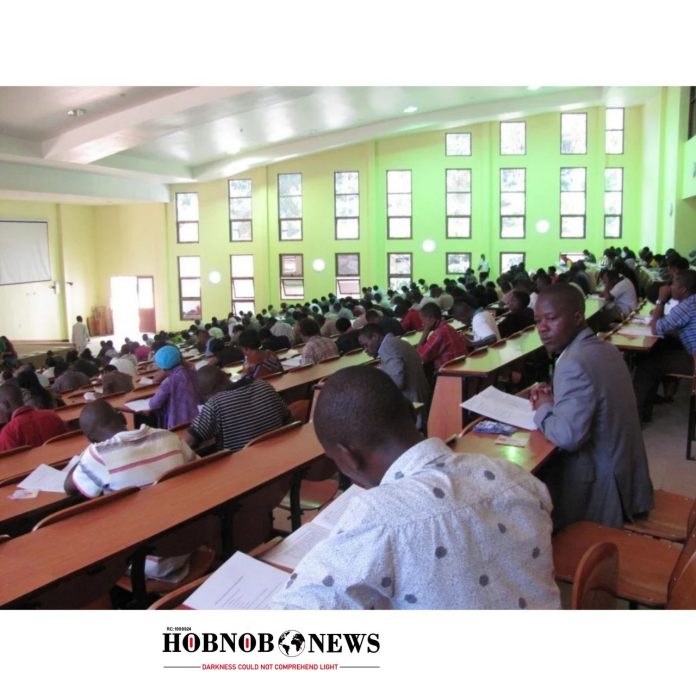The recent proposal by the House of Representatives to impose severe penalties on individuals involved in examination malpractices has drawn significant attention. The proposed legislation, known as the “Examination Malpractices Act (Repeal and Enactment) Bill, 2025 (HB2097),” seeks to introduce stringent penalties for those caught leaking examination questions or engaging in other forms of malpractice. The bill was introduced on March 6, 2025, and is currently awaiting its second reading.
The bill, sponsored by Esosa Iyawe, the representative for Oredo Federal Constituency, aims to repeal the existing Examination Malpractice Act Cap. E15, Laws of the Federation of Nigeria, 2004. It seeks to introduce the Examination Malpractices Act, 2025, which would expand the range of offences related to examination malpractice and ensure the punishment of offenders through non-custodial measures, where applicable. The bill also outlines specific penalties for minors, ensuring they are treated in accordance with the Child Rights Act.
One of the most striking proposals within the bill is the introduction of severe penalties for those caught leaking examination questions. The bill stipulates that anyone convicted of procuring or leaking examination questions, regardless of whether the questions are genuine, could face a fine of N500,000, imprisonment for up to five years, or both. In the case of minors under 18 years of age, the penalty would be a three-year jail term.
The bill also targets those who use technological devices during examinations. Any person found guilty of using such devices would face a similar punishment—either a fine of N500,000, a prison term of up to three years, or both. However, for those in positions of authority—such as principals, teachers, invigilators, supervisors, examiners, or employees of examination bodies—the consequences are far more severe. If these individuals engage in examination malpractice, they could face a four-year prison sentence without the option of a fine.
Additionally, the bill proposes penalties for individuals involved in altering or tampering with examination results. Section 4 of the proposed law specifically targets those employed to mark examination papers. If a person employed to mark papers alters or tampers with a candidate’s scores, either intentionally or without lawful excuse, they could be fined N400,000 or face four years of imprisonment, or both. Similarly, anyone found altering or tampering with scores before, during, or after an examination, or assisting a candidate to cheat, could face the same penalties.
The bill also includes provisions that criminalize the act of stealing or misappropriating examination materials. A candidate who steals or unlawfully takes a question paper, answer sheet, or script belonging to another candidate would be guilty of an offence and could face a fine of N500,000 or a prison term not exceeding three years, or both. Moreover, impersonating a candidate in an examination is also classified as a criminal act under the bill. Any person found guilty of impersonation would face a fine of N500,000, imprisonment for a term of up to three years, or both. If the offender is under 18 years old, the punishment would be the same, but the imprisonment term would be at the discretion of the court.
Further provisions in Section 6 of the bill address the actions of candidates and others who attempt to cheat or create an unfair advantage. Specifically, if a candidate leaves the examination venue and tries to engage with someone to cheat or gain an advantage, they would be guilty of an offence. The candidate would face a fine of at least N300,000, imprisonment for up to three years, or both. Furthermore, the candidate would not be allowed to re-enter the examination hall or any other designated examination space to continue the test.
Sections 6(2) and 6(3) focus on individuals attempting to assist candidates in cheating or gaining unfair advantages. If a person, without lawful excuse, tries to aid a candidate by communicating information about the examination questions, or if someone who is not involved in the examination’s administration is found near the examination hall with the intention of helping a candidate cheat, they would be committing an offence. If found guilty, the punishment for individuals under the age of 18 would be a fine of N500,000, imprisonment for up to three years, or both. For those in positions of authority, such as principals, teachers, invigilators, supervisors, examiners, or employees of the examination body, the penalty would be a four-year prison sentence without the option of a fine.
The bill’s provisions reflect a firm stance on curbing examination malpractice in Nigeria, emphasizing strict penalties for offenders, regardless of their age or position. The proposed legislation also underscores the importance of protecting the integrity of the examination process and ensuring fairness for all candidates. If passed, this law could significantly impact the way examination malpractices are handled, serving as both a deterrent and a corrective measure for those involved in fraudulent activities related to examinations.

